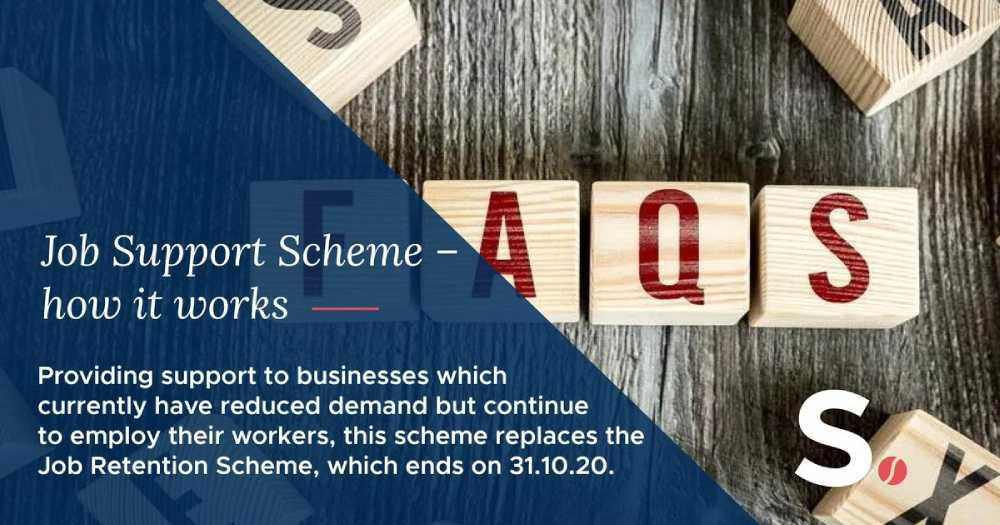
(Last updated 05.11.20)
| UPDATE – On 31 October it was announced that the existing furlough scheme will be extended to cover the new National lockdown period and following further announcements, will therefore cover November 2020 to March 2021 (and potentially beyond). The JSS will be postponed until the furlough extension ends |
(Previous update 26.10.20)
The Job Support Scheme is designed to give support to businesses which have reduced demand, but which continue to employ their workers. It is due to replace the Coronavirus Job Retention scheme, which was due to end on 31 October 2020 before the announcement to extend it on 31 October..
Overview of the Job Support Scheme
The scheme will run from 1 November 2020 to 30 April 2021 and will be reviewed after the first three months.
Under the scheme the employer will pay their employee for hours worked, but payment for any hours not worked will be split between the employer and the Government and if agreed with the employee can be at a reduced level.
To qualify for the grant:
-
The employee must work at least 20% of their “usual hours” (reduced from 33% as per the original announcements).
-
The employer must contribute at least 5% of the pay for the hours not worked, capped at £125 per month (reduced from 1/3rd as per the original announcements).
-
The Government will contribute 61.67% of the employee’s “usual pay”, capped at £1,541.75 per month per employee (increase from £697.92 per month as per the original announcements)
-
Employers can agree with employees whether they will pay them full wages or a reduced amount of at least the 5%/£125 minimum required.
In practice, the Government will provide a grant to employers for up to 61.67% of “usual hours” up to a cap of £1,541.75 per month. This will ensure employees receive a minimum of 73% of their normal wages (where the Government contribution has not been capped).
Is my business eligible for the Job Support Scheme?
It will be open to employers across the UK even if they have not previously used the furlough scheme.
However, large employers will need to meet a financial assessment test, and may not be able to make capital distributions (e.g. dividends) whilst claiming the grant.
Will my employees qualify?
Employees on a payroll notified to HMRC on or before 23 September 2020 can qualify, providing they work at least 20% of their “usual hours” (and are paid for those hours).
It is expected that the calculation of “usual hours” will be based on the CJRS guidance, although more guidance is yet to be announced on that.
Other points
- As under the CJRS, grant payments will be made in arrears, and claims can only be made once the employee has been paid (and the payment has been reported to HMRC via RTI). The first claims will be possible from 8 December 2020.
- The grant will not cover Class 1 employer NICs or pension contributions, although these contributions will remain payable by the employer on the total employee pay.
- Employers must agree the new arrangements with their staff in writing, especially if the employees are to be paid below their full wages, and this agreement must be made available to HMRC on request. We recommend seeking legal advice from an employment lawyer on what documentation is required.
If my business is closed due to COVID restrictions what should I do?
There is an extension to the Job Support Scheme for businesses told to close under Coranavirus measures. See our additional guidance on this.
Example
|
The HMRC factsheet is available, but please do get in touch with your normal Shorts contact to talk any of the above through in more detail.
Useful link:

Other related news:

David Robinson
As a Tax Partner, I advise clients on all aspects of UK tax, ranging from business taxes, transactions and private client matters, helping to achieve the objectives and aspirations of businesses and their owners.
View my articlesTags: Business Taxes, Covid-19
